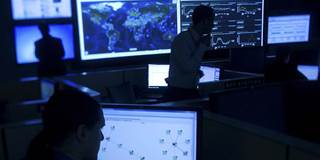The Russian cyber attacks that were meant to skew the 2016 US election toward Donald Trump have raised new concerns about conflicts in cyberspace. How might normative taboos, such as those against chemical and biological weapons, be adapted to the cyber realm?
CAMBRIDGE – A series of episodes in recent years – including Russia’s cyber interventions to skew the United States’ 2016 presidential election toward Donald Trump, the anonymous cyber-attacks that disrupted Ukraine’s electricity system in 2015, and the “Stuxnet” virus that destroyed a thousand Iranian centrifuges – has fueled growing concern about conflict in cyberspace. At last month’s Munich Security Conference, Dutch Foreign Minister Bert Koenders announced the formation of a new non-governmental Global Commission on the Stability of Cyberspace to supplement the UN Group of Governmental Experts (GGE).

CAMBRIDGE – A series of episodes in recent years – including Russia’s cyber interventions to skew the United States’ 2016 presidential election toward Donald Trump, the anonymous cyber-attacks that disrupted Ukraine’s electricity system in 2015, and the “Stuxnet” virus that destroyed a thousand Iranian centrifuges – has fueled growing concern about conflict in cyberspace. At last month’s Munich Security Conference, Dutch Foreign Minister Bert Koenders announced the formation of a new non-governmental Global Commission on the Stability of Cyberspace to supplement the UN Group of Governmental Experts (GGE).